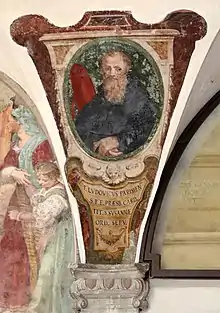Louis de La Palud
Louis de La Palud (c. 1375 – 1451) (called the Cardinal of Varambon or the Cardinal of Maurienne) was a French Roman Catholic bishop and cardinal.

Biography
Louis de La Palud was born in Châtillon-la-Palud sometime between 1370 and 1380.[1] He was the son of Aymé de La Palud, seigneur of Varambon, and Alix de Corgenon.[1]
He studied at the Collège de Sorbonne, receiving a doctorate.[1] He then entered the Order of Saint Benedict in Tournus, and was ordained as a priest.[1] He became abbot of Our Lady of Ambronay in 1404, and then abbot of Tournus in 1413.[1]
He was present at the Council of Constance (1414–18), during which time he served as guardian of the 1417 papal conclave that elected Pope Martin V.[1] He later served as a deputy to the Council of Siena (1423–24), and then to the Council of Florence (1431–38).[1]
Near the beginning of the Council of Florence, on June 6, 1431 he was elected Bishop of Lausanne.[1] He was transferred to the see of Avignon on November 4, 1433.[1] The Council of Florence sent La Palud to Greece to attempt a reconciliation with the Eastern Orthodox Church.[1] When he returned to Basel, he adhered to the party of Antipope Felix V.[1]
On April 12, 1440, Antipope Felix V made him a pseudocardinal in Thonon-les-Bains, awarding him the titular church of Santa Susanna.[1] He was transferred to the see of Saint-Jean-de-Maurienne, in July 1441 and occupied that see until his death.[1] In 1445, he became prior in commendam of Aiton.[1]
Cardinal de La Palud later submitted to Pope Nicholas V.[1] Nicholas V made him a cardinal priest in the consistory of December 19, 1449; he received the titular church of Sant'Anastasia al Palatino on January 12, 1450.[1] He entered Rome on December 11, 1450 and received the red hat on December 12, 1450.[1]
He died in Rome on September 21, 1451.[1] He is buried in St. Peter's Basilica.[1]